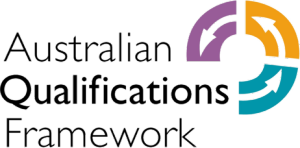
Vocational education is education that prepares people to work as a technician or to take up employment in a skilled craft or trade as a tradesperson or artisan. Vocational education is sometimes referred to as career and technical education.

The Australian Qualifications Framework (AQF) specifies the standards for educational qualifications in Australia. It is administered nationally by the Australian Government's Department of Industry, with oversight from the States and Territories, through the Standing Council of Tertiary Education Skills and Employment. While the AQF specifies the standards, education and training organisations are authorised by accrediting authorities to issue a qualification.

TAFE South Australia provides vocational education and training in South Australia. The acronym TAFE stands for Technical and Further Education and is used and recognised nationally throughout Australia. TAFE SA is a Registered training organisation (RTO) under the jurisdiction of the Australian Skills Quality Authority (ASQA).
Korea University of Technology and Education, is a 4-year university which was established by the Korean government in 1991 to foster practical engineers and HRD specialists and TVET teachers based on the educational philosophy of "Seeking truth from facts".
A national qualifications framework is a formal system describing qualifications. 47 countries participating in the Bologna Process are committed to producing a national qualifications framework. Other countries not part of this process also have national qualifications frameworks.
Vision International College was founded in 1974 in Launceston, Tasmania by Ken Chant, an Australian theologian and author. Now located outside of Sydney, Australia in Minto, New South Wales, the college provides vocational ministry training by distance education with an emphasis on community service. The Reverend Denis Plant now serves as the principal of the college.
The Commonwealth Register of Institutions and Courses for Overseas Students (CRICOS) is a register formed under the Education Services for Overseas Students (ESOS) Act 2000. It maintains a list of institutions, and courses, which have been granted permission by states and territories, to educate overseas students. It is a Federal framework under the authority of state and territory jurisdiction, and providers must register through these agents to legally educate and train international students. CRICOS, in conjunction with other federal and state/territory bodies and legislation, provides strict guidelines for institutions, accepts and/or declines registrations, monitors registered institutions’ compliance and ensures financial capability and stability.

Tertiary education in Australia is formal education beyond high school, consisting of both government and private institutions and divided into two sectors; vocational education and training and higher education. 69% of Australians aged 20–64 have a non-school qualification, and 24% have multiple qualifications.

The South African Qualifications Authority (SAQA) is a statutory body, regulated in terms of the National Qualifications Framework Act No. 67 of 2008. It is made up of 29 members appointed by the Minister of Education in consultation with the Minister of Labour. SAQA is mandated by legislation to oversee the development and implementation of the National Qualifications Framework (NQF).

Education in Western Australia consists of public and private schools in the state of Western Australia, including public and private universities and TAFE colleges. Public school education is supervised by the Department of Education, which forms part of the Government of Western Australia. The School Curriculum and Standards Authority is an independent statutory authority responsible for developing a curriculum and associated standards in all schools, and for ensuring standards of student achievement, and for the assessment and certification according to those standards.

Education in Victoria, Australia is supervised by the Department of Education and Training (DET), which is part of the State Government and whose role is to 'provide policy and planning advice for the delivery of education'. It acts as advisor to two state ministers, that for Education and for Children and Early Childhood Development.
A training package is a set of nationally endorsed training standards, qualifications and guidelines in Australia.
The National Training System is the Australian system for vocational education and training (VET) under the Australian Quality Training Framework (AQTF), in which employers, the States of Australia, and the Commonwealth Government, formalise a curriculum available for Registered Training Organisations (RTOs) to teach and assess the competency of students.
Martin College is an Australian vocational education and training (VET) provider with campuses in Brisbane, Melbourne and central Sydney. The college is also part of Study Group International, a worldwide specialist education company.
The Tertiary Education Quality and Standards Agency (TEQSA) is Australia's independent national quality assurance and regulatory agency for higher education.

Australian Industry Trade College (AITC) - RTO 31775, is an independent, senior school for Young People located in Robina, Cleveland and the Sunshine Coast, Queensland, Australia. Students in Years 10, 11 and 12 undertake school-based apprenticeships or traineeships which include paid work placements and the opportunity to complete vocational education training in the student's chosen area.
Established in 1988, Macleay College is an Australian accredited higher education provider located in Chippendale, New South Wales. It offers two-year Bachelor degrees in advertising and media, digital media, journalism and business; and one-year Diploma courses in journalism, advertising and media, digital media, marketing and business management, with specialisations available in event management, entrepreneurship, real estate, public relations, travel and tourism or sports business.
The "Engineering Institute of Technology" (EIT) is a private college operating globally. Founded in 2008, with headquarters in Perth, Australia. EIT is a Registered Training Organisation (RTO) in the Vocational Education and Training Sector (VET) in Australia and is regulated by the Australian Skills Quality Authority (ASQA).
The Australian Institute of Fitness (AIF) is a privately owned, registered training organisation, and the largest fitness training organisation in Australia. Beginning operations as the Health Studio Attendants course in Perth in 1979, the Institute became Australia's first national fitness training provider in 2000, with the merger of five state-based fitness training programs.
Australian College of the Arts Pty Ltd (Collarts) is an Australian independent tertiary education provider, with four campuses in Melbourne, Victoria.







